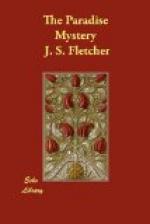Of these three, two were young, and the third was one of those men whose age it is never easy to guess—a tall, clean-shaven, bright-eyed, alert-looking man, good-looking in a clever, professional sort of way, a man whom no one could have taken for anything but a member of one of the learned callings. In some lights he looked no more than forty: a strong light betrayed the fact that his dark hair had a streak of grey in it, and was showing a tendency to whiten about the temples. A strong, intellectually superior man, this, scrupulously groomed and well-dressed, as befitted what he really was—a medical practitioner with an excellent connection amongst the exclusive society of a cathedral town. Around him hung an undeniable air of content and prosperity —as he turned over a pile of letters which stood by his plate, or glanced at the morning newspaper which lay at his elbow, it was easy to see that he had no cares beyond those of the day, and that they—so far as he knew then—were not likely to affect him greatly. Seeing him in these pleasant domestic circumstances, at the head of his table, with abundant evidences of comfort and refinement and modest luxury about him, any one would have said, without hesitation, that Dr. Mark Ransford was undeniably one of the fortunate folk of this world.
The second person of the three was a boy of apparently seventeen—a well-built, handsome lad of the senior schoolboy type, who was devoting himself in business-like fashion to two widely-differing pursuits—one, the consumption of eggs and bacon and dry toast; the other, the study of a Latin textbook, which he had propped up in front of him against the old-fashioned silver cruet. His quick eyes wandered alternately between his book and his plate; now and then he muttered a line or two to himself. His companions took no notice of these combinations of eating and learning: they knew from experience that it was his way to make up at breakfast-time for the moments he had stolen from his studies the night before.
It was not difficult to see that the third member of the party, a girl of nineteen or twenty, was the boy’s sister. Each had a wealth of brown hair, inclining, in the girl’s case to a shade that had tints of gold in it; each had grey eyes, in which there was a mixture of blue; each had a bright, vivid colour; each was undeniably good-looking and eminently healthy. No one would have doubted that both had lived a good deal of an open-air existence: the boy was already muscular and sinewy: the girl looked as if she was well acquainted with the tennis racket and the golf-stick. Nor would any one have made the mistake of thinking that these two were blood relations of the man at the head of the table—between them and him there was not the least resemblance of feature, of colour, or of manner.
While the boy learnt the last lines of his Latin, and the doctor turned over the newspaper, the girl read a letter —evidently, from the large sprawling handwriting, the missive of some girlish correspondent. She was deep in it when, from one of the turrets of the Cathedral, a bell began to ring. At that, she glanced at her brother.




